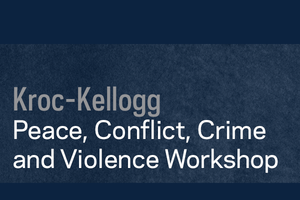Kroc-Kellogg Peace, Conflict, Crime and Violence Workshop

“Mobilizing Support for Transitional Justice: Why Victims’ Voices Reduce Partisan-Motivated Opposition to Accountability”
Featuring:
Natán Skigin, Ph.D. student, Department of Political Science, University of Notre Dame
Guillermo Trejo, Professor of Political Science, University of Notre Dame
Abstract:
In crime-ridden settings such as those affected by large-scale criminal violence, citizens and elites often stigmatize victims of human rights abuses because they perceive them to be involved in criminal activities rather than innocent victims. International and local human rights NGOs often have to change minds among reticent populations in order to activate accountability mechanisms, curb violence, and pave the way for policies that help societies recover from human rights abuses such as transitional justice. How can they do so on a mass scale? Through a large-scale survey experiment (N = 2,524), I assess the effectiveness of two methods of persuasion: perspective-getting —hearing about the personal experiences of stigmatized groups— and changing perceptions of social norms — behaviors considered typical or desirable. I test these interventions in Mexico’s Drug War, which generated a human rights crisis that features both state security forces and drug cartels as perpetrators. Participants were randomly assigned to either a control group or to one of two treatment conditions: a video that narrates the hardships of the mother of a victim of enforced disappearance or a message that reveals how common it is to help victims. The results indicate that both treatments significantly reduced stigma and increased inclusionary behavior in the form of an anonymous letter supportive of the disappeared. However, the perspective-getting strategy seems more effective: its effects are of larger magnitude, longer-lasting, and activate several mechanisms that the norms message does not, including empathy. These findings stress how powerful personal narratives can shift citizens' minds.
Open to Ph.D. students, fellows, and faculty who are interested in civil war, violence, crime, peace, conflict management, and conflict resolution. The workshop is an informal gathering to discuss work-in-progress, dissertation chapters and proposals, practice conference talks, etc.
The workshop format assumes that participants come to the workshop having read the paper. A discussant will start the discussion with 5-10 minutes of comments, then the floor is open.
https://notredame.zoom.us/j/91591523585?pwd=RmlvQ2h6NEVhRSs2azFkYU8xaVptdz09
password: kkpccvw